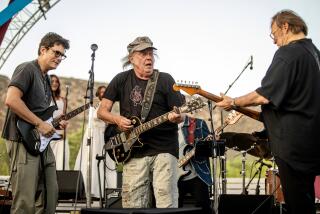AC/DC founding member Malcolm Young dies at 64
- Share via
Reporting from new york — Malcolm Young, the AC/DC co-founder whose brash guitar riffs, tight songwriting and live-wire personality defined an era of rock ’n’ roll, has died. He was 64.
AC/DC announced his death on its official Facebook page on Saturday. The exact time, location and cause of his death were not immediately made public. Young had been diagnosed with dementia in 2014 and did not perform with the group on its recent comeback tour. The statement said that he died peacefully in the company of close family.
“Renowned for his musical prowess, Malcolm was a songwriter, guitarist, performer, producer and visionary who inspired many,” the band said in its statement. “From the outset, he knew what he wanted to achieve and, along with his younger brother, took to the world stage giving their all at every show. Nothing less would do for their fans.”
Over 40 years, AC/DC would sell more than 200 million albums of riff-driven, sometimes juvenile but always anthemic rock, including 1980’s “Back in Black,” which remains the second-best selling rock album of all time.
Born in Glasgow, Scotland, in 1953, Young moved with his family to Sydney, Australia, in 1963, and formed AC/DC with his brother Angus in 1973 after watching older brother George find success with his group the Easybeats. Though Angus, with his schoolboy costumes and flamboyant lead guitar work, was the de facto frontman, Young was its musical core and primary writer for most of the group’s hits, which included stadium-rock staples such as “Highway to Hell” and “Back In Black.”
His exacting, blues-driven guitar work was the foundation for AC/DC’s sound, and Young was widely considered one of rock’s greatest rhythm guitarists. “Malcolm Young was one of the best ever rhythm guitarists in rock ’n’ roll,” said Guns N’ Roses guitarist Slash in Rolling Stone. “He was a fantastic songwriter and he had a great work ethic too.“
“It is a sad day in rock and roll,” said Eddie Van Halen, in a post on Twitter. “Malcolm Young was my friend and the heart and soul of AC/DC. I had some of the best times of my life with him on our 1984 European tour.”
After settling in with drummer Phil Rudd and bassist Mark Evans (later replaced by Cliff Williams), the group scored significant hits early on with singer Bon Scott. The act debuted in 1975 with “High Voltage,” followed by a string of popular records including “T.N.T.,” featuring fan favorite “It’s a Long Way to the Top (If You Wanna Rock’n’ Roll),” later that year. Early success continued with 1976’s “Dirty Deeds Done Dirt Cheap” and 1977’s” Let There Be Rock.”
The act’s 1979 LP “Highway to Hell” cracked the Billboard top 25 and went gold in America. But its future was thrown into doubt after Scott died in 1980 after an all-night drinking session.
The band soon recovered, bringing on new singer Brian Johnson. AC/DC quickly wrote what would be the defining LP of its career, 1980’s “Back in Black.” The LP, whose cover was an all-black tribute to Scott, sported some its most popular singles, including “You Shook Me All Night Long,” “Rock and Roll Ain’t Noise Pollution,” “Hells Bells” and the title track. Its 1981 followup, “For Those About to Rock We Salute You,” continued its hot streak, topping album charts in the U.S.
The hard-partying group saw some controversy during its ascent. While songs like “Beating Around the Bush” and “Big Balls” were tongue-in-cheek bar stool jokes, conservative activists accused the band of satanic imagery (including the rumor that its name stood for “Anti-Christ/Devil Children” – the group members actually got it from the voltage on back of their sister’s sewing machine). The Los Angeles serial killer Richard Ramirez was a notorious fan, leaving an AC/DC hat at the site of one of his murders.
“Part of AC/DC’s appeal to its predominantly young, male audience is the band’s flashy, high-energy show and the hell-raising bravado of its lyrics,” said the L.A. Times’ Robert Hilburn in a 1982 profile of the band. “But it also helps that the group makes adults uneasy. Much the same way rock extremists as Jimi Hendrix, the Rolling Stones, the Doors, David Bowie and Alice Cooper did earlier.”
AC/DC remained one of the world’s biggest rock bands. The band’s hard-drinking lifestyle, which had already claimed Scott’s life, again caught up with the act when Malcolm announced that he needed to temporarily leave the group to get sober. He was briefly replaced by his nephew Stevie Young, who would later again replace Malcolm after his dementia diagnosis.
Malcolm’s return on 1990’s “The Razor’s Edge” helped make it a multiplatinum smash in the U.S., selling 5 million copies, and its subsequent tour was documented on the concert album “Live.” In 2003, the group was inducted into the Rock and Roll Hall of Fame, and again topped U.S. charts with its 2008 LP “Black Ice.” AC/DC won its only Grammy in 2009 for best hard rock performance for “War Machine.” Malcolm last performed live with the group in 2008.
In 2014, after his dementia diagnosis, Young announced he would permanently leave the group. They recorded one final album, 2014’s “Rock or Bust,” without him, and his absence weighed heavily on the group as it prepared for a comeback tour, including a headline date at the Coachella Valley Music and Arts Festival in 2015.
“You pick yourself up, dust yourself down and just keep going,” singer Brian Johnson told The Times in 2015. “You live on, and you have a wonderful memory of them always with you, but you’re not going to stop doing what you do. Otherwise, you die inside, you know? And we would die — I would, if I didn’t do what I was doing. There’d be nothing.”
Young is survived by his wife O’Linda, children Cara and Ross, son-in-law Josh, three grandchildren and his sister and brother.
UPDATES:
12:30 p.m.: This article has been updated with a statement from AC/DC, additional information about Malcolm Young’s life and career and comments from Slash and Eddie Van Halen.
This article was originally published at 8:05 a.m.
More to Read
Start your day right
Sign up for Essential California for the L.A. Times biggest news, features and recommendations in your inbox six days a week.
You may occasionally receive promotional content from the Los Angeles Times.







